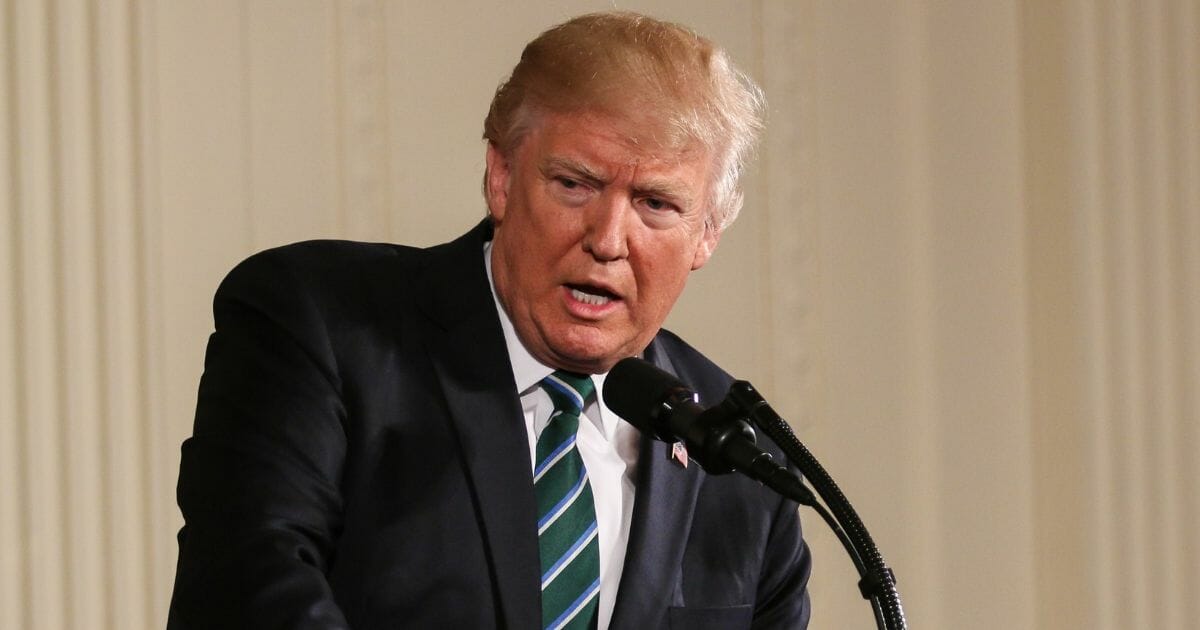
Trump Tells Foreign Countries They Need To Protect Themselves: 'We Don’t Even Need To Be There'
President Donald Trump on Monday said nations worried about the safety of oil tankers bound for their ports should play a role in protecting their own interests and not expect the U.S. to be the only nation defending traffic in the Persian Gulf and Strait of Hormuz.
“China gets 91% of its Oil from the Straight, Japan 62%, & many other countries likewise. So why are we protecting the shipping lanes for other countries (many years) for zero compensation,” Trump wrote in a pair of tweets.
“All of these countries should be protecting their own ships on what has always been a dangerous journey,” he continued. “We don’t even need to be there in that the U.S. has just become (by far) the largest producer of Energy anywhere in the world!
“The U.S. request for Iran is very simple – No Nuclear Weapons and No Further Sponsoring of Terror!”
….a dangerous journey. We don’t even need to be there in that the U.S. has just become (by far) the largest producer of Energy anywhere in the world! The U.S. request for Iran is very simple – No Nuclear Weapons and No Further Sponsoring of Terror!
— Donald J. Trump (@realDonaldTrump) June 24, 2019
Throughout his presidency, Trump has focused heavily on pressuring other nations to step up their defense spending and be less reliant on the U.S. taxpayer for global military protection.
Trump has frequently criticized NATO partners for not paying their fair share of Western Europe’s defense costs, but Monday’s tweets were a rare example of him making the argument in regard to the protection of shipping lanes for oil and other goods.
The president has, however, made efforts to augment the security situation in the Middle East in recent weeks, saying he will unveil new sanctions against Iran in response to the nation’s alleged attacks on two oil tankers and their downing of a U.S. drone last week.
Brian Hook, the administration’s special representative to Iran, said long-term pressure is the key element in the administration’s plan, according to CNBC.
“[U]ltimately we would like to have a new deal that addresses Iran’s regional aggression, the missile program and its nuclear program. In order to do that, it is going to take pressure. And in order to get Iran to change its behavior, it is going to take a lot of pressure. So we are going to increase our sanctions on Iran, we are going to continue with this foreign policy,” he said.
Hook had also dropped hints about the new sanctions, which Trump and Treasury Secretary Steven Mnuchin unveiled hours later on Monday.
“I can say that when you look at Iran’s largest sources of export revenues — it’s oil, petrochemicals, precious metals and industrial metals. We have now sanctioned all four of those categories,” Hook said.
“We have blacklisted over 70 Iranian banks that the Swift financial system also matched our sanctions. We have collapsed foreign direct investment. We are driving up the cost of the Iranian regime for behaving the way it does,” he added.
Hook was also quoted Monday in The Guardian as saying the U.S. would propose a multi-national tanker protection force.
“There have been too many attacks. We could have had an environmental disaster and extensive loss of life due to reckless Iranian provocations,” he said, assuring the U.S. will continue to stand tall against Iran.
“It is an outlaw regime, it is corrupt religious mafia that exports violence around the middle east and around the world. And we are standing up to it in ways that has no historic precedent,” Hook said.
Trump’s tweet came days after two tankers in the Gulf of Oman were attacked. The U.S. has blamed Iran for the attacks.
Last week, a U.S. surveillance drone was shot down by Iran, which claimed the drone was in its airspace. The U.S. has denied that claim and was preparing a military response against Iran for its actions, but Trump canceled the attack at the last minute.
The U.S. did, however, launch a cyber attack against Iran’s military, Military Times reported Sunday.
The report, which quoted unnamed officials, said the attacks disabled computer systems that control rocket and missile launches in Iran.
The recent attacks, coupled with rising tensions since the U.S. began a military expansion in the region in May, resulted in Secretary of State Mike Pompeo meeting Monday with leaders from Saudi Arabia and the United Arab Emirates.
Productive meeting with King Salman bin Abdulaziz Al Saud today to discuss heightened tensions in the region and the need to promote maritime security in the Strait of Hormuz. Freedom of navigation is paramount. pic.twitter.com/efuZq5EOpK
— Secretary Pompeo (@SecPompeo) June 24, 2019
“Productive meeting with King Salman bin Abdulaziz Al Saud today to discuss heightened tensions in the region and the need to promote maritime security in the Strait of Hormuz. Freedom of navigation is paramount,” Pompeo tweeted.
Truth and Accuracy
We are committed to truth and accuracy in all of our journalism. Read our editorial standards.
Advertise with The Western Journal and reach millions of highly engaged readers, while supporting our work. Advertise Today.












